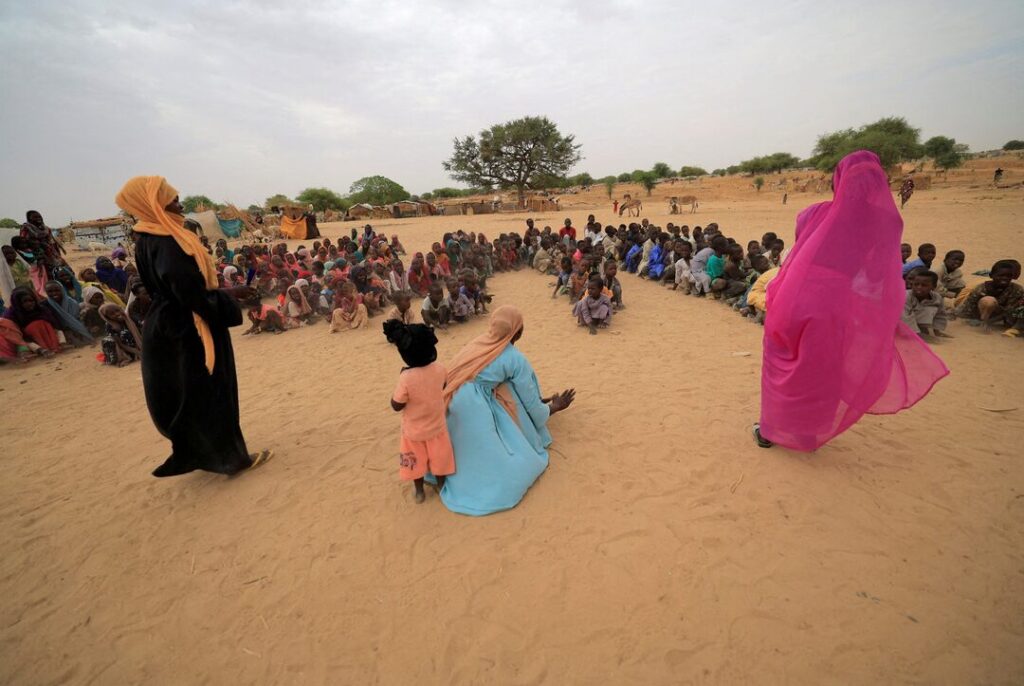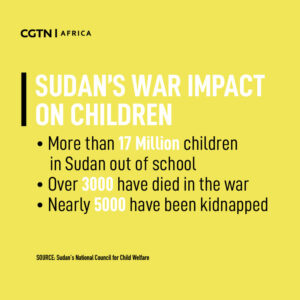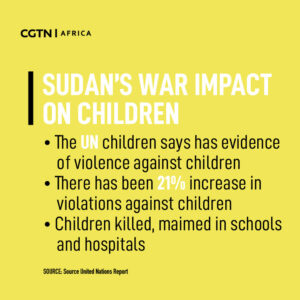
Sudan’s war forces 17 million children out of school; 5,000 reported missing
Two years after the outbreak of Sudan’s devastating civil war between the Sudanese Armed Forces (SAF) and the Rapid Support Forces (RSF) in April 2023, the conflict has left an indelible mark on the nation’s children. Nearly 17 million have been forced out of school across the Northeast African nation.
This staggering figure, reported by UNICEF and the Sudan National Council for Child Welfare, reflects a profound educational crisis that has deepened existing vulnerabilities. These children, deprived of learning opportunities, are facing with severe challenges, including inadequate access to food, clean water, and healthcare services, as the war disrupts supply chains and destroys critical infrastructure.

According to the Sudan National Council for Child Welfare, the conflict has exacted a horrific toll beyond education: at least 5,000 children have been kidnapped or reported missing, and more than 3,000 have lost their lives due to violence, starvation, or lack of medical care.

Mandeep O’Brien, Director of UNICEF’s Public Partnerships Division and former UNICEF Representative to Sudan, highlighted the escalating crisis: “Before the war, we had 7 million children out of school; since the conflict began, this number has skyrocketed to 17 million. Similarly, acute malnutrition has worsened, with 4 million children now affected, up from 3 million before the war.”
This malnutrition crisis, coupled with limited healthcare access, has left millions of children at risk of long-term developmental setbacks.
The war’s impact extends beyond education and survival, with a surge in grave violations against children. Verified reports confirm a disturbing rise in child abuse, including forced recruitment into armed groups, sexual violence, and enslavement.
Dr. Abdelgadir Abuh, Secretary General of Sudan’s National Council for Child Welfare, provided chilling details: “We have verified tens of cases of children forcibly recruited by the Rapid Support Forces to fight in the conflict. Some have returned to their families, but others were killed, and many remain kidnapped.
Adding that, the scale of violence is immense and terrifying, underscoring the urgent need for global collaboration to prevent an even greater humanitarian catastrophe.”
A 2023 United Nations report further corroborated these findings, documenting a 21 percent increase in grave violations against children compared to the previous year. The report blacklisted several entities, including factions of the SAF and RSF, for killing and maiming children and for deliberate attacks on schools and hospitals, which have crippled educational and medical infrastructure.
In 2023 alone, over 1,500 schools were damaged or destroyed, leaving millions without safe spaces to learn. The UN also noted that the use of children as human shields and the targeting of civilian infrastructure have reached “extreme levels,” exacerbating the humanitarian crisis.
 Sudan’s newly appointed Prime Minister Kamil Idris, in his first broadcast address to the nation on state-run Sudan TV on Sunday, outlined his government’s priorities amid the ongoing conflict.
Sudan’s newly appointed Prime Minister Kamil Idris, in his first broadcast address to the nation on state-run Sudan TV on Sunday, outlined his government’s priorities amid the ongoing conflict.
Idris urged for the restoration of national security and state authority as vital steps to stabilize Sudan.
He called for a comprehensive national recovery plan, promoting an inclusive, Sudanese-led dialogue to foster unity and rebuild trust. Additionally, stressing the importance of a cohesive national identity to heal the war-torn nation, strongly rejecting regionalism and racism.
International efforts to mediate an end to the conflict, led by entities like the African Union, Qatar, and Egypt, have yielded limited progress. Ceasefire talks, including those hosted in Jeddah in 2023 and 2024, have repeatedly collapsed, with both the SAF and RSF accusing each other of violations.
The ongoing violence has displaced over ten million people, including five million children, many of whom have fled to neighboring countries like Chad and South Sudan, straining regional resources. Humanitarian aid delivery remains hampered by insecurity and bureaucratic obstacles, with only 40 percent of the UN’s 2025 Sudan appeal funded as of May.
For Sudan’s children, the stakes could not be higher. Each day of conflict brings new threats—hunger, disease, exploitation, and lost opportunities. Yet, like children in other conflict zones, they cling to hope for peace, yearning to return to classrooms, playgrounds, and a semblance of normalcy.
With inputs from wires






